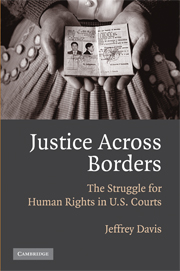Book contents
- Frontmatter
- Contents
- Acknowledgments
- JUSTICE ACROSS BORDERS
- 1 The Seeds of Legal Accountability
- 2 Competing Forces in the Struggle for Accountability: An Overview of the Issues Entangling ATS Litigation
- 3 Human Rights Entrepreneurs: NGOs and the ATS Revolution
- 4 Separation of Powers and Human Rights Cases
- 5 No Safe Haven: Human Rights Cases Challenging Foreign Countries and Nationals
- 6 Holding Corporations Accountable for Human Rights Violations
- 7 Sorting through the Ashes: Testing Findings and Predictions through Quantitative Analysis
- 8 Impacts and Conclusion
- Index
- References
3 - Human Rights Entrepreneurs: NGOs and the ATS Revolution
Published online by Cambridge University Press: 05 June 2012
- Frontmatter
- Contents
- Acknowledgments
- JUSTICE ACROSS BORDERS
- 1 The Seeds of Legal Accountability
- 2 Competing Forces in the Struggle for Accountability: An Overview of the Issues Entangling ATS Litigation
- 3 Human Rights Entrepreneurs: NGOs and the ATS Revolution
- 4 Separation of Powers and Human Rights Cases
- 5 No Safe Haven: Human Rights Cases Challenging Foreign Countries and Nationals
- 6 Holding Corporations Accountable for Human Rights Violations
- 7 Sorting through the Ashes: Testing Findings and Predictions through Quantitative Analysis
- 8 Impacts and Conclusion
- Index
- References
Summary
DOE V. SARAVIA
“In the name of God, then, and in the name of this suffering people, whose cries rise to heaven each day more tumultuous, I beseech you, I beg you, I order you, in the name of God, stop the repression.” On March 23, 1980, Archbishop Oscar Romero, delivered this homily in El Salvador demanding that the military cease its campaign of repression. The next day an assassin shot Archbishop Romero to death as he blessed the Eucharist during mass. Romero was a champion for the justice and dignity of the poor in El Salvador. “During his life he came to be known as the ‘Voice of the Voiceless,’ and his model has stood for nearly 25 years as one of the world's most revered beacons of hope.” As one of his fellow priests recalled, the poor in El Salvador “saw him as a man of God, a man who spoke the truth, a man that defended the poor, a man that was close to them.” He was one of the most important and recognizable figures in the struggle for human rights in Latin America. His assassination was a seminal event for El Salvador and the region. Nonetheless, no one has ever been punished for committing or planning the crime.
Those responsible for the assassination thwarted any attempt to hold them accountable. On the night of the killing, Judge Ramirez Amaya began an investigation by ordering an autopsy and securing bullet fragments.
- Type
- Chapter
- Information
- Justice Across BordersThe Struggle for Human Rights in U.S. Courts, pp. 44 - 88Publisher: Cambridge University PressPrint publication year: 2008



